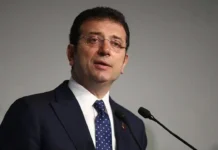Seventeen suspects, including Turkey’s renowned journalists Nazlı Ilıcak, Ahmet Altan and Mehmet Altan, are ready to appear before an İstanbul court on Monday for the first time in an investigation into the faith-based Gülen movement, which the Turkish government accuses of masterminding a controversial coup attempt on July 15, 2016.
An indictment drafted by the İstanbul Chief Public Prosecutor’s Office in April 2017, seeks three consecutive life sentences for the suspects on coup charges.
The suspects mentioned in the indictment are former Zaman daily CEO Ekrem Dumanlı, former Today’s Zaman Editor-in-Chief Bülent Keneş, Samanyolu TV Washington representative Şemsettin Efe, Zaman daily journalist Abdülkerim Balcı, Zaman former deputy editor-in-chief Mehmet Kamış, Zaman executive Faruk Kardıç, Zaman daily design director Fevzi Yazıcı, Zaman brand manager Yakup Şimşek, Zaman culture and arts editor Ali Çolak, journalists Nazlı Ilıcak, Ahmet Altan and Mehmet Altan, Professor Osman Özsoy, academic Şükrü Tuğrul Özşengül.
They are accused of attempting to overthrow the constitutional order, the Turkish government and the Turkish Parliament.
Emre Uslu and Tuncay Opçin, two journalists who have hundreds of followers on Twitter, are also mentioned in the indictment.
The Zaman daily, the Today’s Zaman newspaper and Samanyolu TV are among dozens of media outlets that were closed down by the government in the aftermath of the controversial failed coup attempt on July 15 due to their affiliation with the Gülen movement.
The government accuses the group of masterminding the coup attempt, while the movement strongly denies the accusation.
Journalist brothers Ahmet Altan and Mehmet Altan, who were detained on Sept. 10, were accused of sending “subliminal” messages regarding the failed coup attempt on a TV show a day before the putsch.
After spending 12 days in detention, journalist and academic Mehmet Altan was arrested by an İstanbul court on Sept. 22, while his brother Ahmet Altan was released under judicial supervision.
Police detained Ahmet Altan later the same day after the İstanbul 1st Penal Court of Peace issued a warrant for his detention.
Ahmet Altan was arrested by an İstanbul court on Sept. 23 for allegedly “attempting a coup” and “membership in ‘FETÖ’,” a term the government coined to refer to the faith-based Gülen movement.
The Altan brothers are prominent journalists who have been unequivocally critical of the regime of President Recep Tayyip Erdoğan.
Ahmet Altan is a novelist and former editor-in-chief of the Taraf newspaper. The daily ran headlines that led to the Ergenekon and Balyoz coup plot investigations, which helped the Justice and Development Party (AKP) government suppress the role of the military in Turkish politics. After quitting Taraf, Altan resumed writing harsh critical columns against the increasingly authoritarian AKP government and President Erdoğan.
Mehmet Altan, a professor of economics at İstanbul University, is also a columnist known for his liberal views and criticism of the government amid increasing and unprecedented pressure on the media and dissidents. He was recently targeted by pro-Erdoğan columnist Hilal Kaplan for not being dismissed from his position at the university at a time when hundreds of academics and teachers were being expelled from their posts as part of an investigation into the failed coup attempt.
Turkey is the leading jailer of journalists in the world. The Stockholm Center for Freedom (SCF) has documented that 264 journalists are now in jails as of June 16, most in pre-trial detention languishing in notorious Turkish prisons without even a conviction. Of those in Turkish prisons, 240 are arrested pending trial, only 24 journalists remain convicted and serving time in Turkish prisons. An outstanding detention warrants remain for 105 journalists who live in exile or remain at large in Turkey.
Detaining tens of thousands of people over alleged links to the movement, the government also closed down more than 180 media outlets after the controversial coup attempt.
A controversial military coup attempt on July 15 killed over 240 people. Immediately after the putsch, the Justice and Development Party (AKP) government along with Turkey’s autocratic President Recep Tayyip Erdoğan pinned the blame on the Gülen movement.
Fethullah Gülen, who inspired the movement, strongly denied having any role in the failed coup and called for an international investigation into it, but President Erdoğan — calling the coup attempt “a gift from God” — and the government initiated a widespread purge aimed at cleansing sympathizers of the movement from within state institutions, dehumanizing its popular figures and putting them in custody.
At least 161,751 people were detained or investigated and 50,334 people were arrested in Turkey in the framework of the Turkish government’s massive post-coup witch hunt campaign targeting alleged members of the Gülen movement since the controversial coup attempt on July 15, 2016, according to statistics reported by state-run Anadolu news agency by basing on information taken from the officials from Turkey’s Justice Minsitry on June 13. (SCF with turkeypurge.com) June 19, 2017















